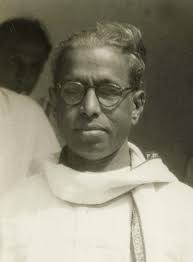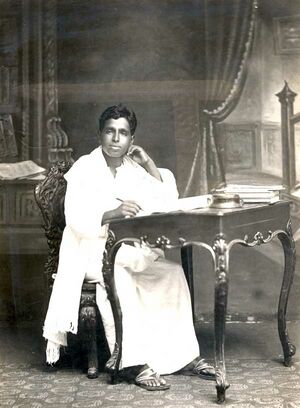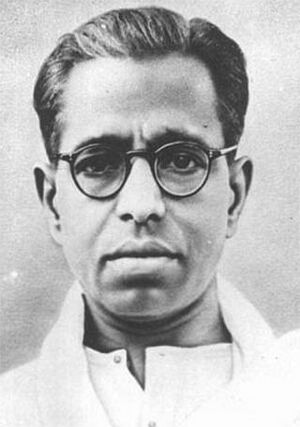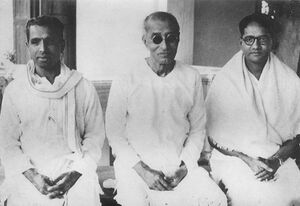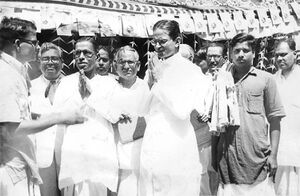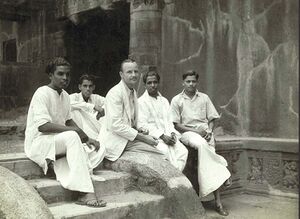Kalki (writer)
இந்தப் பக்கத்தை தமிழில் வாசிக்க: [[{{{Name of target page}}}|{{{Title of target page}}}]]
Kalki (Ra. Krishnamurthy) (September 9, 1899 - December 5, 1954) was an author who wrote some of the most popular historical romances in Tamil. Kalki was a writer who emerged from the Indian freedom struggle movement. He was also the pioneer of the Tamilisai Iyakkam, a movement that advocated for greater representation of Tamil songs in Carnatic concerts, and Tamil journalism. He made significant contributions in the evolution of modern Tamil prose. Historical romance novels such as Ponniyin Selvan, Sivagamiyin Sabatham written by Kalki are some of the most beloved classics of popular Tamil fiction. Kalki was the founder of Kalki magazine.
Biography
Birth, Education
Kalki was born on September 9, 1899 in Puthamangalam near Mayiladuthurai in the old Thanjavur district. His father was Ramasamy Iyer and his mother was Thayyal Nayagi. After completing his primary schooling in his village, he attended Mayuram Municipal High School. He then joined Trichy National High School. He did not complete his schooling as he joined the national movement at an early age and took part in the freedom struggle.
Private life
Kalki married Rukmini in 1924. He had a son (Rajendran) and a daughter (Anandi). He worked as a journalist for Thiru.V. Kalyanasundaram 's Navasakthi magazine and later for Ananda Vikatan. He successfully started a magazine under his own name – Kalki
Political career
Kalki had a long political career. When Gandhi started the Non-Cooperation Movement in 1921, he was inspired by his ideas and joined the Indian National Congress. He took part in the freedom struggle in 1922 and was sentenced to one year of imprisonment. After he was released, he joined the Tamil Nadu Congress Party headquartered at Trichy. He worked in the Khadar office in Erode for some time. In 1923 he worked as an co-editor of the magazine Navasakthi run by Thiru.V. Kalyanasundaram. In Tiruchengode Rajaji inaugurated the Gandhi Ashram on February 6, 1925 and started the magazine ‘Vimochanam’. Kalki went to Tiruchengode and stayed with Rajaji where he then lead Vimochanam magazine. Kalki considered Rajaji his political mentor. He followed Rajaji’s political views and stayed with him till his death. He was known as 'Rajaji's sword'. In 1930, he participated the Salt Satyagraha led by Rajaji and was arrested at Gobichettipalayam for violating the Salt Act of 1882. He was imprisoned for six months. When Gandhi declared the Quit India movement in 1940, he resigned his job as editor of Ananda Vikatan magazine and joined the struggle. He was sentenced to three months of rigorous imprisonment.
Journalism
Kalki was a relentless journalist since 1923. He worked as the co-editor of Thiru.V. Kalyanasundaram's Navasakthi magazine. In 1931 he became the co editor of the Ananda Vikatan magazine started by S.S. Vasan. Kalki made Ananda Vikatan a successful public magazine. <<Ananda Vikatan magazine made pleasure reading a campaign in Tamil culture and as a successful business.>> Kalki developed a simple style of humor and satire suitable for the general readers. He created a lineage of writers like Devan, Thumilan etc. who followed his style of writing. He pioneered journalistic writing in many sub-fields, including film criticism and political criticism.
Kalki started the magazine Kalki in 1941 with the help of his friend Sadasivam, the reason being that Ananda Vikadan's S.S. Vasan denounced Kalki’s involvement in the Quit India Movement and actions against the government. Rajaji blessed Kalki for his venture into Kalki magazine. It became a very successful magazine due to the historical romance he wrote in the magazine, called Parthiban Kanavu. Kalki then published a series of famous novels, including Sivagamiyin Sabatham and Ponniyin Selvan.
Kalki introduced many writers with newer styles of writing that differed from his own style, including Mayavi and P.M. Kannan. Na.Parthasarathy (Manivannan) who followed in Kalki's footsteps were inspired by the writing styles of V.S. Khandekar and M.Varadarasan. Thus Kalki was one of the foremost pioneers of Tamil journalism and popular Tamil fiction.
Literary life
Mahatma Gandhi's autobiography was serialized in Navjeevan from 1925 to 1929. Kalki simultaneously published an abridged Tamil translation of this work in Navasakthi. He also wrote stories for Navasakthi in the same period. When the magazine 'Ananda Vikatan' was launched, a friend of Subramania Bharathi, Parali S. Nellaiyappar, introduced Kalki to S.S. Vasan in February 1928. Kalki wrote a humorous article titled 'Ettikku Potti' in Ananda Vikatan. This was the first article written by Krishnamurthy under the pseudonym Kalki. A subsequent collection of essays entitled 'Ettikku Potti' was published in 1927 with an introduction by Rajagopalachari.
At the age of 23, Kalki wrote the novel 'Vimala' while in prison for being involved with the Non-Cooperation Movement. It was biographical in character, about a young man imprisoned for his involvement in the Non-Cooperation Movement. This novel was published as a series in 1923 by V. Ramasamy Iyerngar (Va. Ra) in his magizine ‘Susindran’, under the name Ra. Krishnamurthy.
In 1937 he published his first series ‘Kalvannin Kadhali’ in Anantha Vikatan under his pen name Kalki. Following ‘Kalvannin Kadhali’ he published ‘Thiaga Bhoomi’ in Anantha Vikatan which was made into a motion picture. After he started his magazine Kalki, he published his first historical romance ‘Parthiban Kanavu’. His most famous novels were ‘Sivagamiyin Sabatham’ and ‘Ponniyin Selvan’, which were later published in his magazine Kalki. ‘Ponniyin Selvan’ which he started writing in 1952 was considered to be the foremost popular literary work in Tamil.
Tamil Music Movement
Kalki was one of the pioneers of the Tamilisai Iyakkam (Tamil music movement), which was started with the demand that Carnatic music concerts should give a prominent place to Tamil compositions. He wrote numerous articles in support of the Tamil music movement. In 1941 he attended the first Tamil Music Conference organized by Raja Annamalai Chettiar in Chennai. His articles in support of the Tamil Music Movement have been compiled into a book titled 'Sangeethayogam'.
Cultural works
- Kalki attended the Tamil Music Conference held at Ettayapuram in 1945 . During the ceremony, a request was made of him to build a memorial hall for Subramaniya Bharathi at Ettayapuram. Kalki put forth the same request to the reading public through his magazine. The hall was inaugurated by C. Rajagopalachari on October 13, 1947.
- Kalki raised funds for Bharathi's wife Chellamma Bharathi in 1945 and created a deposit fund.
- After the demise of writer Puthumaipithan, who was a fierce critic of Kalki in 1948, Kalki raised funds to save his wife Kamala and daughter who were living in poverty. A significant amount was donated to her.
Literary Significance
Kalki's primary literary contribution was his contribution to the development of Tamil prose. He expanded all the possibilities of Tamil prose by writing a series of entertaining novels, magazine articles, short stories, travelogues, music criticism, film criticism, political criticism, satire and biographies. In this regard, he was a pioneer. Three generations of writers have followed him since.
Early novels of Kalki such as Kalki's ‘Thiyaga Bhoomi’ are similar to those of George W.M. Reynolds, full of thrills and sentiment. Kalki's storytelling was influenced by pioneers such as Vaduvoor Duraisamy Iyengar. He later wrote historical novels. Kalki cites writers such as Sir Walter Scott and Alexander Dumas as his inspirations. Critics considered novels such as ‘Parthiban Kanavu’, ‘Sivagamiyin Sabatham’, and ‘Ponniyin Selvan’ to be historical romances.
But unlike his predecessors, Kalki's works, although wildly popular, contained elements of the Indian national uprising, Tamil cultural renaissance and social reform of his time. His historical novels depicted the historical golden age of the Tamils. His novels were based on the historical research done by historians like K.A. Neelakanta Shastri, they took the history of the Cholas and Pallavas to the lay public. They reinforced the Tamil national pride that was emerging at that time. Kalki's novels depict the cultural evolution of Tamil Nadu. ‘Sivagamiyin Sabatham’ echoes the tone and sentiments of Ramayana while ‘Ponniyin Selvan’ has the tone of Mahabharata. ‘Ponniyin Selvan’ was influenced by novels such as Alexander Dumas' ‘The Three Musketteers’ and ‘The Man in the Iron Mask’. In his book ‘Naveena Thamizhilakiya Arimugam’ (Introduction to modern Tamil literature), writer Jeyamohan notes that Kalki 'combined the spirit of the Indian epic tradition with the descriptive narration of Western adventure stories to create his fiction'
Controversies
- In 1936, Kalki made a controversial statement that Subramania Bharathi was not one of the Mahakavis (great poets) of India, an opinion that was opposed by writers like Ku.Pa. Rajagopalan. This was known as the 'Bharathi-Mahakavi controversy'. The writers wrote a series of articles back and forth on this topic in 1936, which were later compiled and published by Rajagopalan under the title Kannan En Kavi.
- In 1937, Puthumaipithan accused Kalki of plagiarising from the novels of Alexander Dumas and Walter Scott. Kalki denied the accusation. This became a controversy, with many authors and critics weighing in with their opinions.
- When Gandhi announced his Temple Entry Movement in 1939, the head of the Kanchi mutt, Chandrasekara Saraswati opposed it. Kalki vehemently objected saying, "You are the leader of a caste, not a jagatguru (Teacher of the World)." This statement became controversial.
Works
Novels
- Kalvannin Kadhali (Theif’s Lover) (1937)
- Thiyaga Bhoomi (Land of Sacrifice)(1938-1939)
- Magudapathi (1942)
- Abalayin Kaneer (Tears of Distress) (1947)
- Solaimalai Ilavarasi (Princess of Sholaimalai) (1947)
- Alai Osai (Sound of the Waves) (1948)
- Devakiyin Kanavan (Devaki's Husband) (1950)
- Mohini Theevu (Mohini Island) (1950)
- Poiman Karadu (1951)
- Punnaivanathupuli (Tiger of Punnaivanam) (1952)
- Amaradhara (1954)
Historical novels
- Parthiban Kanavu (Parthiban’s Dream) (1941 - 1943)
- Sivagamiyin Sabatham (Sivagami's vow) (1944 - 1946)
- Ponniyin Selvan (Son of Ponni) (1951 - 1954)
Short stories
- Subathirayin Sagothiran (Brother of Subhadra)
- Ottrai Roja (Single rose)
- Theepiditha kudisaikal (Huts on Fire)
- Pudhu Overseer (The New Overseer)
- Vasthudhu Venu
- Amara Vazhvu (Etrnal Life)
- Sunduvin Sanyasam (The asceticism of Sundu)
- Thirudaṉ Magaṉ Tirudaṉ
- Imayamalai Eṅkaḷ Malai (The Himalayas are our mountain)
- Poṅgumaakadal
- Māsṭar Meduvaṭai
- Pushpa Pallaku (The Flower Palanquin)
- Pirapala Naṭcathiram (Celebrity star)
- Pitthaḷai Oṭṭiyāṇam (Brass Ottiyanam)
- Aruṇāchalathiṉ aluval (Officials of Arunachal)
- Parisal Tuṟai
- Susila M. A.
- Kamalāviṉ Kalyāṇam (Kamala's wedding)
- Thaṟkolai (Suicide)
- S. S. Menaka
- Sarathaiyin Thantiram
- Governer Vijayam (Governor's visit)
- Number
- Oṉpathu Kuḻi Nilam (Nine pit land)
- Puṉṉaivaṉathu puli (Tiger of Punnaivanam)
- Tiruvaḻunthūr Sivakkoḻuntu
- Zamīṉtdār Magaṉ (Son of Zamindar)
- Mayilai Kāḷai
- Rangadurgam Raja
- Idintha Kōṭṭai (The ruined fort)
- Mayilvizhi Maāṉ
- Nāṭakakkāri
- “Tappili Cup"
- Kaṇaiyāḻiyiṉ Kaṉavu
- Kēdāriyiṉ Thāyār (Kedari's mother)
- Gānthimathiyiṉ Kādalaṉ (Gandhimathi's Lover)
- Chiranjeevi Kathai
- Srīkānthaṉ Puṉarjaṉmam (Srikanthan’s Rebirth)
- Pāḻadaintha Bungalow (Dilapidated bungalow)
- Chandramathi
- Pōlīce Virunthu (Police party)
- Kaithiyiṉ Pirārthtaṉai (Prisoner's Prayer)
- Kāriruḷil oru miṉṉal (A lightning in the car)
- Thandaiyum Makaṉum (Father and Son)
- Bhavani, B. A, B. L
- Kadithamum Kaṇeerum (Letter and tears)
- Vaira Mōthiram (Diamond ring)
- Veena Bhavani
- Thooku thaṇdaṉai
- Eṉ Deivam (My deity)
- Ejamāṉa Vishvasam
- Idu eṉṉa Sorgam (What a paradise it is)
- Kailasam ayyar Cabare
- Lanjam Vāṅkāthavaṉ (The one who does not take bribes)
- Cinema Kathai (Cinema story)
- Eṅgaḷ oorr Saṅgeetha Pōṭṭi
- Rangoon Māppiḷḷai (Rangoon Groom)
- Dēvakiyiṉ Kaṇavaṉ (Devaki's husband)
- Bala Josier
- Mādathēvaṉ Suṉai
- Kaāthaṟāk Kaḷḷaṉ
- Mālatiyiṉ thandai (Malathi's father)
- Veedu Thēdum Paṭalam
- Neeṇda Mugavurai (Long preface)
- Paāṅgar Vināyakarāo
- Deyvayāṉai
- Gōvinthaṉum Veerappaṉum (Govindan and Veerappan)
- Ciṉṉathambiyum Thiruṭargaḷum
- Vithūṣakaṉ Ciṉṉumuthali
- Arasoor Pañchāyattu (Arasur Panchayat)
- Governer Vaṇdi
- Thaṇdaṉai Yārukku (Punishment for whom? )
- Chuyanalam (Selfishness)
- Puli Rājā (Tiger King)
- Viṣha Mandiram (Poison spell)
Essays
- Ettikku Potti - Comedy Articles
- Sangeethayogam - Articles on Tamil Music - 1947, Tamilpannai Publication.
Translated works
Novels like Ponni's Selvan, Sivagamiyin Sapatham, Parthiban Kanavu, Alai Osai have been translated into English by many.
In other forms
Movie
- Kalvanin Kadhali, written by Kalki, was made into a motion picture in 1955 by V.S. Raghavan
- Thiyaga Bhoomi written by Kalki was made into a film in 1939 under the direction of K. Subramaniam
- Meera, written by Kalki and starring M.S. Subbulakshmi, was released in 1945. Kalki wrote the story and dialogue for the film and five songs. The film was a success and the money earned became an investment in Kalki magazine
- Parthiban Kanavu, written by Kalki, was made into a film in 1960 under the direction of Yoganath
Drama
Works like Ponniyin Selvan and Sivagamiyin Sabatham have been staged by various theater groups.
Awards
Sahitya Akademi Award, 1956 - Alai Osai
Sangeetha Kalasikamani Award, 1953, The Indian Fine Arts Society
Death
Kalki passed away on December 5, 1954 at the age of 55. He suffered from tuberculosis for five years.
Case Record
Writer Sunda (Meenakshi Sundaram) has written a biography of Kalki under the title "Son of Ponni". It was serialized in Kalki magazine
References
https://www.kalkibiography.com/
Sangeetha Yoga https://www.jmi.ac.in/upload/departments/history/drs/Cankita%20yokam.pdf
